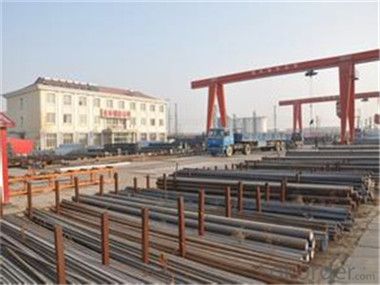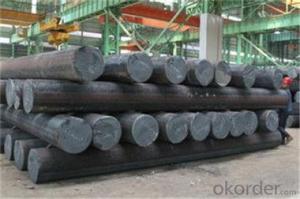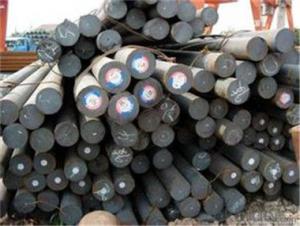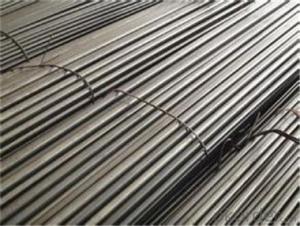Steel Round Bar Reliable Manufacturers from China
- Loading Port:
- Tianjin
- Payment Terms:
- TT OR LC
- Min Order Qty:
- 554 m.t.
- Supply Capability:
- 2000000 m.t./month
OKorder Service Pledge
OKorder Financial Service
You Might Also Like
Description of steel round bar:
1. Commodity: Round steel bar
3. Technical: Hot rolling
2. Length: Min. 5.8meter, according to requirement.
3. Diameter: 16mm-250mm
Festures of steel round bar:
1.Dia 80-800mm Length:2000-13000mm or as required
2.Technique:Forged
3.Delivery Time:45 days
Specifications of steel round bar:
1. Standards: AISI 4340 8620 8640 4320 , JIS SNCM8 GB:40CrNiMoA
2. Specification: Dia: 80~450mm Length:2000-13000mm or as required
The highest temperature is 427 degrees Celsius.it has good strength,and high quenching property ,the toughness is good and small deformation during quenching.At high temperature.
C | Si | Mn | S | P | Cr | Ni | Cu | Mo |
0.37-0.44 | 0.17-0.37 | 0.40-0.80 | 0.025(max) | 0.025(max) | 0.60-0.90 | 1.25-1.65 | 0.025(max) | 0.15-0.25 |
Images of steel round bar:

FAQ:
1. What is your package?
Packing situation: standard seaworthy packing or as customer required.
2. How long is the lead time?
Delivery time: 45 days after order confirmed.
3. What payment term do you accept?
Payment: T/T or L/C at sight.
- Q:Can steel round bars be used in the production of HVAC equipment?
- Yes, steel round bars can definitely be used in the production of HVAC (Heating, Ventilation, and Air Conditioning) equipment. Steel round bars are widely utilized in the manufacturing of various HVAC components such as air ducts, frames, supports, brackets, and other structural elements. Steel is a popular choice in HVAC equipment due to its excellent strength, durability, and resistance to corrosion. Its high tensile strength makes it suitable for handling the mechanical stresses and loads experienced by HVAC systems. Additionally, steel can withstand high temperatures and is non-combustible, making it a safe material for HVAC applications. Overall, steel round bars are widely utilized in the production of HVAC equipment for their reliability, longevity, and performance.
- Q:Can steel round bars be used in the manufacturing of couplings?
- Yes, steel round bars can be used in the manufacturing of couplings.
- Q:Lightning protection earthing zinc plating flat iron and round steel welding method, need to flat iron wrapped in round steel outside welding?
- Unwanted。 The round bar shall be welded directly on flat steel, requiring both sides of the round bar to be welded, and the length of lap welding shall be 6 times of the diameter of round steel.
- Q:What are the different types of steel alloys used for round bars?
- Round bars can be made from various steel alloys, each possessing unique characteristics that make them suitable for different purposes. Some commonly used steel alloys for round bars are as follows: 1. Carbon Steel: The most prevalent type of steel alloy for round bars, carbon steel is primarily composed of carbon and iron. It offers exceptional strength and toughness, making it ideal for applications in construction, manufacturing, and general engineering. 2. Stainless Steel: This alloy incorporates chromium, which grants it excellent resistance to corrosion. Consequently, stainless steel round bars are extensively utilized in the food and beverage industry, as well as in marine and chemical sectors where rust or oxidation is a concern. 3. Alloy Steel: This steel alloy is produced by adding elements like manganese, nickel, or chromium to enhance its mechanical properties. Alloy steel round bars are renowned for their high strength, hardness, and resistance to wear and tear. As a result, they find widespread use in automotive, aerospace, and machinery industries. 4. Tool Steel: Tool steel alloys are specifically engineered to possess remarkable hardness, wear resistance, and toughness. They are employed in the production of cutting tools, dies, and molds. Tool steel round bars are available in different grades, such as D2, O1, and A2, each offering specific properties for distinct applications. 5. Duplex Steel: This alloy combines austenitic and ferritic stainless steels, resulting in a blend of high strength and corrosion resistance. Duplex steel round bars are preferred in applications where both strength and resistance to corrosion are essential, such as in the oil and gas industry. These examples demonstrate the diversity of steel alloys used for round bars. The choice of a specific alloy depends on the desired properties and the intended application of the round bar.
- Q:What is the elasticity of a steel round bar?
- The elasticity of a steel round bar refers to its ability to return to its original shape after being subjected to external forces or deformation. Steel is known for its high elasticity, meaning it can withstand significant stress and strain without permanent deformation. This property makes steel round bars suitable for various applications, including construction, manufacturing, and engineering.
- Q:Can steel round bars be used for making fasteners?
- Certainly! Fasteners can indeed be made using steel round bars. Manufacturers commonly utilize steel round bars to produce fasteners like bolts, screws, and rivets. The strength and durability of steel make it an excellent choice for fasteners, as it can endure significant stress and ensure a secure connection. Moreover, steel round bars can be conveniently machined and threaded to achieve the desired shape and size required for fasteners. In summary, steel round bars are highly dependable and frequently employed in the manufacturing process of fasteners.
- Q:Can steel round bars be heat treated to enhance their properties?
- Steel round bars can undergo heat treatment to improve their properties. This process involves controlled heating and cooling to modify the microstructure of the steel, ultimately enhancing its mechanical properties like strength, hardness, toughness, and ductility. Various heat treatment methods can be employed based on the desired outcome. One commonly used method is quenching and tempering. This involves heating the steel to high temperatures, forming a uniform austenitic structure, then rapidly cooling it in oil or water to transform the austenite into a stronger structure called martensite. However, martensite can be brittle, so the steel is subsequently tempered by reheating it at lower temperatures to reduce brittleness while maintaining the desired hardness. Another method is annealing, where the steel is heated to a specific temperature and slowly cooled to relieve internal stresses and enhance ductility. This process also refines the grain structure of the steel, improving machinability and formability. Furthermore, there are other heat treatment methods like normalizing, stress relieving, and case hardening, each tailored to enhance specific properties of steel round bars. Overall, heat treatment is a versatile and effective technique for enhancing the properties of steel round bars, enabling them to meet specific requirements in industries such as manufacturing, construction, automotive, and aerospace.
- Q:What is the maximum manganese content allowed for steel round bars?
- The maximum manganese content allowed for steel round bars typically varies depending on the specific grade or specification of the steel. However, in general, most steel round bars have a maximum manganese content of around 1-1.5%.
- Q:Can steel round bars be used in the construction equipment industry?
- Yes, steel round bars can be commonly used in the construction equipment industry. They offer excellent strength, durability, and versatility, making them suitable for various applications such as structural components, shafts, axles, and supports in construction equipment. The high tensile strength and resistance to wear and tear make steel round bars an ideal choice for heavy-duty machinery and equipment in the construction industry.
- Q:What are the different joining methods for steel round bars?
- There are several different joining methods that can be used for steel round bars, depending on the specific application and desired outcome. Some of the most common joining methods for steel round bars include welding, brazing, and mechanical joining. 1. Welding: Welding is a popular method for joining steel round bars. It involves melting the edges of the bars and fusing them together using heat. Various welding techniques such as arc welding, MIG welding, TIG welding, and spot welding can be used, depending on the thickness and type of steel being joined. Welding provides a strong and permanent bond, making it suitable for heavy-duty applications. 2. Brazing: Brazing is another method used to join steel round bars. It involves heating the bars and melting a filler metal that has a lower melting point than the steel. The molten filler metal is then drawn into the joint by capillary action, creating a strong bond when it solidifies. Brazing is often used when the base metals have different melting points or when a lower-temperature joining process is required. 3. Mechanical joining: Mechanical joining methods do not involve any heat or melting of the steel round bars. Instead, they rely on mechanical means to hold the bars together. Examples of mechanical joining methods include bolted connections, riveting, and clamping. These methods are often used when disassembly or adjustability is required, as they provide a non-permanent joint that can be easily undone. It is important to consider factors such as the strength requirements, environmental conditions, and the specific application when choosing a joining method for steel round bars. Each method has its own advantages and limitations, and the appropriate joining method should be selected to ensure a secure and durable bond between the round bars.
1. Manufacturer Overview |
|
|---|---|
| Location | |
| Year Established | |
| Annual Output Value | |
| Main Markets | |
| Company Certifications | |
2. Manufacturer Certificates |
|
|---|---|
| a) Certification Name | |
| Range | |
| Reference | |
| Validity Period | |
3. Manufacturer Capability |
|
|---|---|
| a)Trade Capacity | |
| Nearest Port | |
| Export Percentage | |
| No.of Employees in Trade Department | |
| Language Spoken: | |
| b)Factory Information | |
| Factory Size: | |
| No. of Production Lines | |
| Contract Manufacturing | |
| Product Price Range | |
Send your message to us
Steel Round Bar Reliable Manufacturers from China
- Loading Port:
- Tianjin
- Payment Terms:
- TT OR LC
- Min Order Qty:
- 554 m.t.
- Supply Capability:
- 2000000 m.t./month
OKorder Service Pledge
OKorder Financial Service
Similar products
New products
Hot products
Hot Searches
Related keywords































